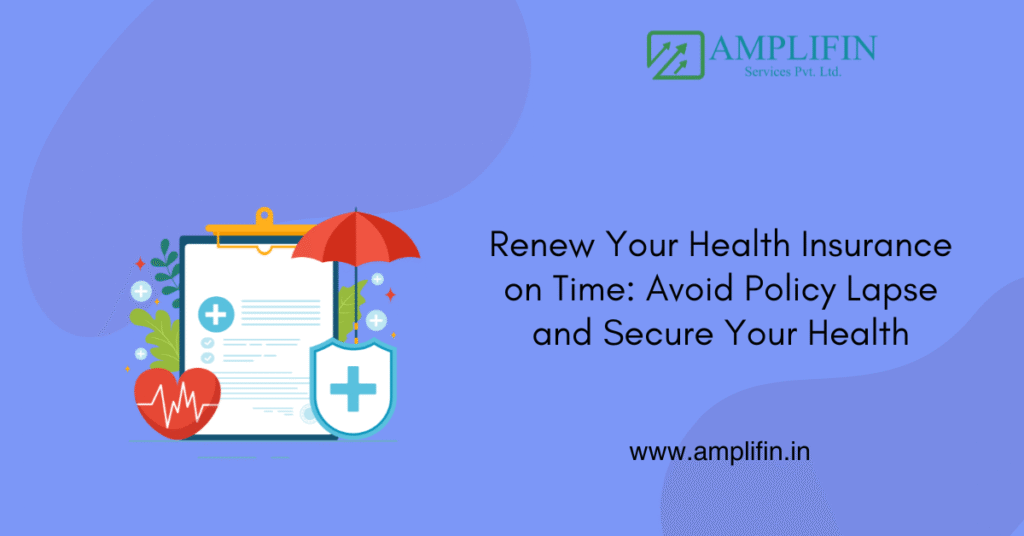Renewing your health insurance policies may not sound exciting, but it’s one of the most crucial financial habits to protect your well-being. If you forget to renew health insurance on time, your insurance policies can lapse, leaving you without coverage when you need it the most. This article explains everything about renewal, grace period, and why you must always renew your health insurance policy on or before the policy renewal date. You’ll also learn what to do if you missed your health insurance renewal and how to regain your health insurance coverage without losing benefits.

Outline
- What Does It Mean to Renew Health Insurance Policies?
- Why Should You Renew Your Health Insurance on Time?
- What Happens If You Miss the Policy Renewal Date?
- How Does a Grace Period in Health Insurance Work?
- What Are the Risks of a Health Insurance Policy Lapse?
- Can You Renew Your Policy Within the Grace Period?
- What Should You Do If Your Policy Has Lapsed?
- How to Renew Health Insurance on Time and Avoid Gaps
- Renewal vs Buying a New Policy: Which Is Better?
- How Does Timely Renewal Support Long-Term Health Insurance Benefits?
1. What Does It Mean to Renew Health Insurance Policies?
To renew a policy simply means extending your existing insurance plan by paying the renewal premium before the expiry. Every health insurance plan has a fixed period in health insurance coverage—usually one year. At the time of renewal, you pay your health insurance premium to keep the coverage active.
When you renew your health insurance policy, you ensure continuity of your medical insurance policy benefits. Unlike buying a new health insurance policy, renewal allows you to retain accumulated benefits like no-claim bonuses, reduced waiting period, and lifelong renewability.
Most health insurance companies send reminders before the policy expiry date, but the responsibility is yours. Remember: if you don’t renew the policy on time, the policy will lapse and may cause you to lose valuable policy benefits.
2. Why Should You Renew Your Health Insurance on Time?
Timely health insurance renewal guarantees uninterrupted health insurance coverage. When you renew your policy on time, you protect yourself and your family from financial strain caused by medical bills.
Another key reason to renew health insurance on time is to avoid a waiting period reset. Many insurance policies include waiting periods for pre-existing conditions. If your policy lapses, you may need to serve those waiting periods all over again.
Finally, paying your premium on time ensures you don’t lose accumulated rewards like wellness discounts or loyalty benefits that your insurance provider may offer. In short: always renew it on time.
3. What Happens If You Miss the Policy Renewal Date?
If the policy renewal date is missed, your insurance policies risk entering a grace period. During this time, you can still renew your health insurance by paying the renewal premium during the grace period.
If you fail to renew within this period, the policy will lapse. Once a health insurance policy lapse occurs, your insurance provider may deny claims, and you’ll lose your health plan benefits.
Missing your policy renewal date can also mean losing continuous coverage. If you need to buy an entirely new policy, you may face higher insurance premium rates and fresh medical tests.
4. How Does a Grace Period in Health Insurance Work?
A grace period in health insurance is the extra time insurance companies offer after the expiry date. Most insurers offer a grace period of 15–30 days to let you pay the renewal premium.
If you renew your policy within the grace period, you can maintain your health insurance coverage without losing continuity. However, remember that during the premium during the grace period, you may not be able to raise claims.
So while the grace period is a safety net, it’s not meant to encourage you to miss the renewal. It’s best to renew your policy on time rather than depend on these extra days.
5. What Are the Risks of a Health Insurance Policy Lapse?
A policy lapse can have serious consequences. Once your health insurance policies lapse, you lose access to the insurance plan benefits and coverage.
If you experience a medical emergency during a lapsed health insurance phase, your insurance provider won’t cover the expenses. That means paying out-of-pocket, which could drain your savings.
Additionally, if your policy cannot be renewed after a policy expiry, you’ll have to buy a new policy. This means fresh waiting periods, higher premiums, and possible exclusions if your health has changed.
6. Can You Renew Your Policy Within the Grace Period?
Yes, you can renew your policy within the grace period provided by health insurance companies. As long as you act within the grace period, your policy continues without being considered a fully lapsed policy.
But be cautious—if you fail to renew your policy even after this window, the policy cannot be renewed, and your policy benefits vanish. You’ll then need to apply for a new policy.
To avoid this hassle, always try to renew your policy on time rather than depending on the grace period as a backup.
7. What Should You Do If Your Policy Has Lapsed?
If your policy has lapsed, don’t panic. First, contact your insurance provider immediately to check if you can revive it. Some health insurance companies allow revival by paying overdue premiums plus penalties.
If revival isn’t possible, you’ll have to buy an entirely new policy or buy a fresh health insurance plan. This may include new medical checkups, longer waiting periods, and higher premiums.
The key lesson: avoid letting your policy expiry reach the stage where your policy cannot be renewed. Always monitor your policy renewal date carefully.
8. How to Renew Health Insurance on Time and Avoid Gaps
To renew health insurance on time, set reminders at least days before the policy expiry. Many insurers allow you to renew your policy online, making the process fast and simple.
Consider automating your renewal premium payments so you never forget to renew your health policy. This way, you can keep the policy active without stress.
Following this simple step ensures you don’t miss your health insurance policy or risk losing the renewal benefits of your existing coverage.
9. Renewal vs Buying a New Policy: Which Is Better?
When comparing renewal vs buying a new policy, renewal almost always wins. By choosing to renew your health insurance plan, you continue enjoying benefits like cumulative bonuses and lower premiums.
If you don’t renew your health insurance and instead buy health insurance again, you’ll face fresh waiting periods. A new health policy may also cost more, especially as age increases.
Renewal is especially vital for insurance for senior citizens, as buying a new policy later in life may be more difficult.
10. How Does Timely Renewal Support Long-Term Health Insurance Benefits?
Timely health insurance renewal gives you peace of mind knowing your medical costs will always be covered. It allows you to regain your health insurance coverage without interruption.
Renewal also helps you avoid losing out on long-term health policy benefits like no-claim bonuses, reduced waiting periods, and lifelong renewability. If you renew your policy on time, you’ll maintain continuous health insurance coverage without gaps.
In essence, always renew the policy by the due date. That way, you’ll never need to scramble to apply for a new policy or lose protection when you need it most.
Key Takeaways: Renew Health Insurance on Time
- Always renew your health insurance policy before the expiry date.
- The grace period is a backup, not a solution—renew your policy on time to avoid risks.
- A policy lapse leads to loss of coverage, higher premiums, and fresh waiting periods.
- If your policy renewal date is missed, act quickly within the grace period.
- A lapsed health insurance policy may force you to buy an entirely new policy.
- Renewal protects valuable benefits like no-claim bonuses and shorter waiting periods.
- Set reminders and pay the renewal premium on time to avoid disruptions.
- Continuous health insurance coverage supports your long-term financial and medical security.
